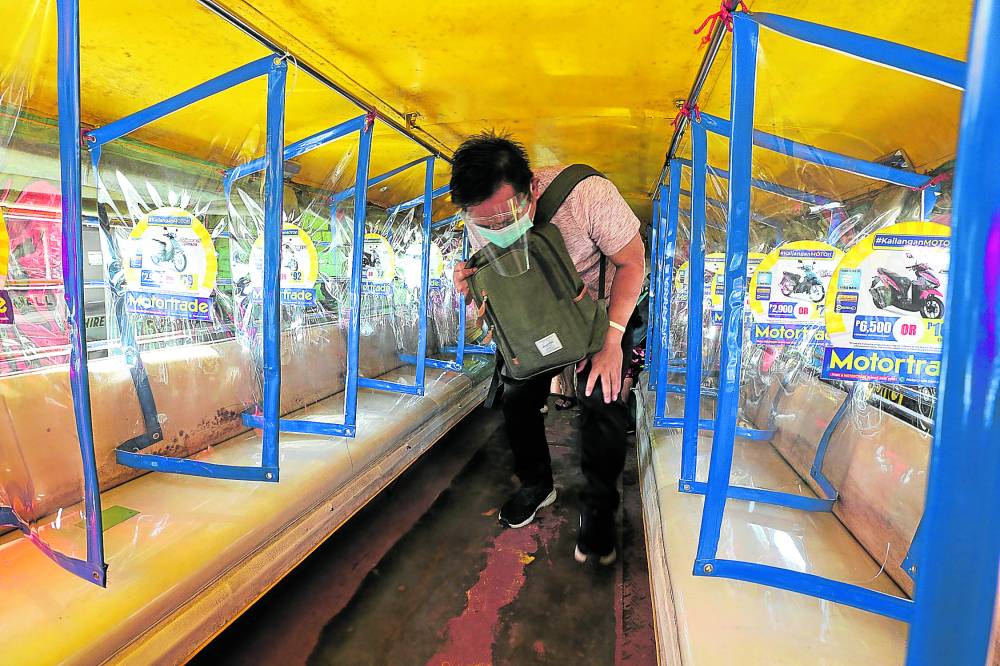Fewer PUV barriers may reduce risk of COVID transmission — Ateneo study

TRAP A study by a team from Ateneo de Manila University says it’s more important to wear masks that perfectly fit the face instead of using barriers that could trap viral loads of COVID-19. —NIñO JESUS ORBETA
Fewer barriers inside public utility vehicles (PUVs) may reduce the risk of COVID-19 transmission, based on a recent study conducted by a team from the Ateneo de Manila University (Admu).
Science and Technology Secretary Fortunato de la Peña said in a report last week that physical barriers such as acetate or face shields and the layout inside PUVs had a big effect on the airflow.
“Accordingly, current LRT (Light Rail Transit) and MRT (Metro Rail Transit) configurations where seats are arranged at the sides and passengers face each other are found to cause better airflow within the vehicle compared to the current commuter bus setup,” De La Peña said, quoting the findings of the Ateneo study. In most passenger buses, seats are lined up horizontally one after the other, with the passengers facing the front of the vehicle.
Titled “Modeling Embarkation-Disembarkation Behavior and Configuration Settings in Philippine Commuter Buses, Light Rail Transit, and Metro Rail Transit using Theoretical and Computational Fluid Dynamics as Analytical Tools in the Mitigation of SARS-CoV-2 Airborne Transmission,” the study was led by Joel Maquiling of Admu.
The project was funded by the Department of Science and Technology’s Philippine Council for Health Research and Development and ran from May to October.
Article continues after this advertisementDe La Peña said the study was aimed at analyzing the significant risk of disease transmission among passengers in buses and light trains.
Article continues after this advertisementTo do this, the Ateneo team performed 3D simulations using the configurations of a passenger bus, the LRT Line 2 and MRT 3.
Based on the results, the layout in trains reduced the number of seats and limited the maximum passenger capacity compared to the setup in buses.
“Aside from barriers, additional inlets or outlets in the vehicles configured in an alternating open-close-open manner will enhance the airflow and flush out any agents of infectious disease like SARS-CoV-2,” De La Peña said.
No medical findings
The project team also stressed that it was more important that passengers wear masks that fit the face perfectly instead of using barriers of any form that could trap viral loads of COVID-19.
In November, the Department of Transportation (DOTr) said that commuters in low-risk areas could choose not to wear face shields in public transportation following the government’s decision to no longer require their use in areas under alert levels 1 to 3.
But with the threat posed by the Omicron variant, Filipinos might need to go back to wearing face shields as advised by President Duterte.
During his public address last week, Mr. Duterte said that those who do not want to get infected with COVID-19 should not throw away their face shields and just continue using them.
“I advise you, because I really firmly believe that the wearing of that face shield has contributed a lot. I cannot quantify or by what percentage; it’s just a gut feeling because our cases are now low,” he said.
In October, the DOTr suspended the mandatory use of plastic barriers in PUVs after admitting that the policy was not based on science.
“Drivers and operators can already remove them because there are no medical findings, based on our studies, that they can prevent the spread of COVID-19. Instead, the virus could stick to them,” said Mark Steven Pastor, assistant transportation secretary for road transport.
For more news about the novel coronavirus click here.
What you need to know about Coronavirus.
For more information on COVID-19, call the DOH Hotline: (02) 86517800 local 1149/1150.
The Inquirer Foundation supports our healthcare frontliners and is still accepting cash donations to be deposited at Banco de Oro (BDO) current account #007960018860 or donate through PayMaya using this link.